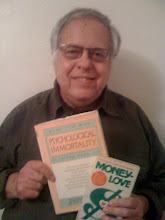Jerry Gillies The start of a rare week, with absolutely nothing scheduled. Not a phone call, or deadline of any kind, or business or social meeting. A hermit-like existence sure to inspire new creative outbursts, but none are scheduled.
This got me to thinking about the value I place on creating unfilled periods of time and unfilled space in my life. When I was in Folsom State Prison, there was a one year period that I considered my best of my entire twelve years of incarceration (you can read my prison story in the Appendix of the free Moneylove Manifesto, which you can download at my other blog:
though I didn't include this particular episode.) I had bribed the housing clerk to keep my cell just for me, single cell status. It cost me $15 a month, but was more than worth it in terms of the extra privacy it gave me to write and think and meditate.
Now, I guess it goes without saying, that like most writers, I am basically a loner. I love people, and even lived in a commune from 1994-1996, and really enjoy being a part of workshops with dozens or hundreds of participants, whether I'm leading them or just one of the students. But I also love opportunities to enjoy my own company, and have even traveled cross country alone in a motorhome several times. (Well, maybe I was cheating, because I had my two cats with me.) I've also crossed the Atlantic on the Queen Elizabeth II by myself, and have done extensive trips lasting months in Europe and South Africa. I'm fortunate, I think, to have a balance between liking the company of others and that of myself alone.
With so much rapid change occurring the the world at an ever-increasing pace, it's vital that we each give ourselves time and space for surprises, for those unexpected events or transitions from the way things were to the way they are going to be. Part of the current unemployment crisis is because many people so filled their lives with the work they were doing that they didn't have the time to realize the old parameters were changing. In my father's time, you worked diligently for a company and could expect to be rewarded with guaranteed job security and a generous pension. What a shock it must be to have that traditional expectation dashed to the ground in today's world. I've talked to many people who are doing well in today's economy. Most of them gave themselves time and space to explore new areas, new uses for their talents and skills, so they had an alternative when all hell broke loose.
How are you with empty time and space? The degree to which you can see these as golden opportunities may indicate whether you have room in your mind and your life for dramatic new events.
I remember a workshop my friend, Jack Canfield, did at a psychology convention some years ago. He borrowed an exercise from our mutual friend and pioneering psychologist Jack Gibb. After introducing himself to the sixty or so participants sitting around a hotel meeting room, he shut up and didn't say a word. Five minutes went by, then ten, then twenty. Grumbling among the participants started. We had all paid for the workshop, so there were some shouts demanding money back. One man stood up and said he was going to create something positive in the adjoining room, and anyone was welcome to join him. Many did. All through this experience, I was thinking to myself, "I would never have the nerve to do this in a workshop, especially one people had paid for." But Jack did, and he trusted that it would produce valuable insight, and lots of material we could all work on about two hours after the workshop began, when he began to conduct the organized part of his program.
How do you think you would have reacted in these circumstances? I once went on a thirty day Zen retreat. While in prison, one of the things that made it bearable was that it was easier than the retreat. As horrible as prison food is, it was tastier than the bland brown rice dishes the Buddhist monks served. And we had to be silent 23 hours a day, except for one hour during a class in which we could ask questions. There was no reading allowed, no phone or TV or radio. And it cost $3000! Oh, and the beds were straw mats, much less comfortable than prison bunks. Of course the big difference was that I could leave anytime I wanted, not so at Folsom. But it produced a powerful realization of the power of silence, and the rewards of inner experience. Doing that inner work is what saved my sanity in prison, and allowed me to go through the twelve years with a sense of optimism and positive creative energy.
Time now to go back to my week of empty time and space, sure to fill up with some more ideas and happy surprises.
Jerry
